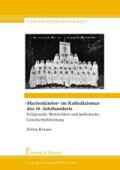This well researched and elaborately documented book sketches the history of the «Children of Mary» from both a Catholic-European and a more detailed Swiss perspective. Whereas most studies on this movement have focused either on its years of origin (as Associations des Enfants de Marie) or on its late-nineteenth-century form (as well-known and widely spread parish movements for single young women, Jungfraukongregationen), this book looks at the movement’s evolution in the long run. Including also the transnational component, Selina Krause not only examines the origins of the «Children of Mary» at schools run by French teaching orders, but describes their transmission from this educational context to parishes and their successful installment in other countries as well. She then continues to study the Swiss case more thoroughly as she discusses the symbolic weight of the title «Child of Mary» (from model student to the elite woman engaged in charitable and apostolic endeavors) and looks into the rituals, structures and activities of the various types of organizations. Furthermore, since the available sources (e.g. diaries of the movement) allow her to delve deeper, she subsequently traces the ways and means by which the members themselves constructed and adopted the ideal of the «Child of Mary».
The study thus bridges two historiographical strands: the research on gender and religion and the studies of the Catholic milieu. First of all, through its focus on a movement created for girls and/or women and its explicit attention for gender ideology, the book contributes to the research on the «feminization» of religion (even though the book’s bibliography on the subject is incomplete). Addressing the various components of the thesis, Krause – with reason – refutes the assumptions that that religion was altered to fit the fe minine character and men’s truancy increased. Referring to her in-depth analysis of the discourse on the «Children of Mary», she does however agree that religiosity was increasingly described as part of «femininity», an attribution that supported a positive perception of women. Secondly, as Krause studies the movement as an intrinsic part of the Catholic society, she questions prior research on the Catholic milieu that – still often blinded by gender stereotypes (particularly the feminine domestic ideal type) – ignored women’s contribution. Krause, on the contrary, demonstrates how women were actively involved in the creation of a Catholic (-conservative) society by supporting meanings and practices that stimulated community feelings. The movements’ goal was to bring «Children of Mary» to identify with the Catholic society and turn them into bearers of collective values.
The book is well written, but suffers from the repetitions that the recurring summaries entail (they are included after each chapter, each part and at the end of the book). Furthermore, whereas the diachronic perspective is emphasized in the description of the history of the movement, it is remarkably absent in Krause’s discussion of the meanings and practices promoted by the school-intern, school-extern and parish movements that all grouped «Children of Mary». Even though the book aims to describe the various facets of the movement throughout the nineteenth century, part III concentrates – as a consequence of the availability of sources – on the years 1870–1900 and on the groups of elite women. The impression that rises from part III is therefore a rather static image (although with contemporaneous variations) making the reader rather curious about the potential shifts and discrepancies, none of which are pointed out. Likewise, we hear almost nothing about the meaning of the movement for its non-elite members, an omission Krause herself is aware of (280). That is a pity, for it might have given this already very rich and ambitious book even more depth.
Zitierweise:
Tine van Osselaer: Rezension zu: Selina Krause, «Marienkinder» im Katholizismus des 19. Jahrhunderts. Religiosität, Weiblichkeit und katholische Gesellschaftsbildung, Berlin, Frank&Timme, 2010. Zuerst erschienen in: Schweizerische Zeitschrift für Religions- und Kulturgeschichte, Vol. 105, 2011, S. 558-559.
